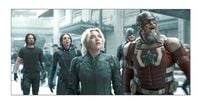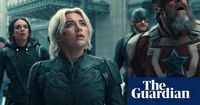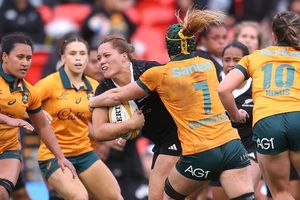In a refreshing twist within the Marvel Cinematic Universe, the new film Thunderbolts dives deep into the complexities of its characters, showcasing a team of antiheroes who grapple with their pasts while attempting to forge a new path. Directed by Jake Schreier and penned by Eric Pearson and Joanna Calo, this latest installment stands out as one of the most engaging Marvel adventures in recent memory.
Starring Florence Pugh as Yelena Belova, the younger sister of the late Natasha Romanoff, the film explores themes of trauma and redemption. Yelena, who has been shaped by a dark history as a product of a covert Russian program, finds herself working as undercover muscle for CIA director Valentina Allegra de Fontaine, portrayed by Julia Louis-Dreyfus. Valentina's breezy menace adds a layer of complexity to the narrative, as she ultimately betrays Yelena, forcing her to join forces with other similarly flawed characters.
Among these characters are Ghost, played by Hannah John-Kamen, who possesses the ability to phase through walls; John Walker, a super-soldier portrayed by Wyatt Russell; and Bob, a seemingly ordinary guy played by Lewis Pullman. Together, they form an unlikely alliance in a desperate attempt to escape Valentina’s clutches.
As the plot unfolds, the team is joined by Bucky Barnes, a formidable fighter with his own emotional scars, played by Sebastian Stan, and Red Guardian, a bumbling yet lovable character brought to life by David Harbour. The crew eventually adopts the name Thunderbolts, inspired by Yelena's childhood soccer team, highlighting their underdog status.
While the film’s storyline may seem formulaic—featuring a plot that involves turning the Thunderbolts into public enemies—it is the character dynamics that provide the film with depth. The action sequences are coherent and engaging, and the interplay between characters balances humor with sincerity. The film serves as a reminder of the fun that superhero movies can offer, contrasting sharply with the more serious tones of recent Marvel entries.
However, Thunderbolts is not just about action and laughs. It delves into the emotional struggles of its characters, particularly Yelena, who is haunted by her past as a child assassin. The film culminates in a surreal sequence that raises poignant questions about loneliness and the power of human connection, challenging the notion of what it means to be a hero.
Florence Pugh and David Harbour, in interviews, expressed their belief that audiences will find the Thunderbolts more relatable than the traditional Avengers. They emphasized that the new team is composed of conflicted and flawed individuals who started as villains before deciding to use their powers for good. This relatable aspect adds a layer of humanity to the Thunderbolts, making them feel more accessible than their more polished predecessors.
Critics have noted that the Thunderbolts, led by Yelena and Red Guardian, may represent a new era for Marvel. Unlike the original Avengers, who were portrayed as Earth's mightiest heroes, the Thunderbolts are depicted as a group of emotionally unstable individuals coming together in a time of need. This shift in narrative focus reflects a broader trend within the Marvel Cinematic Universe, where the exploration of character flaws and vulnerabilities takes center stage.
Despite their shortcomings, the Thunderbolts are portrayed as a team that, while not ideal, is willing to step up when no one else will. This idea resonates with audiences, particularly in a cinematic landscape where traditional heroism is often challenged. The film's self-awareness, including a humorous nod to Captain America’s concerns about copyright infringement, showcases Marvel’s willingness to poke fun at itself while still delivering an engaging story.
However, the Thunderbolts are not without their critics. Some have pointed out that the film's characters come off as more broken than relatable, lacking the charm that typically accompanies superhero teams. While their dysfunction is highlighted, it raises questions about the chemistry and camaraderie that should ideally exist among team members. The film hints at a deeper exploration of these themes, suggesting that the Thunderbolts may not be the cohesive unit that audiences expect.
As the Marvel Cinematic Universe continues to evolve, the Thunderbolts represent a bold step toward embracing a more complex narrative structure. The film challenges traditional notions of heroism and villainy, inviting viewers to reconsider what it means to be a hero in a world filled with moral ambiguity. The Thunderbolts may not be the saviors we envisioned, but they embody the flawed humanity that resonates with audiences today.
In a cinematic landscape filled with predictable narratives, Thunderbolts* stands out as a film that dares to explore the darker corners of its characters' psyches while still delivering the action and excitement fans have come to expect from Marvel. With its blend of humor, heart, and a touch of existential reflection, the film is poised to leave a lasting impact on the franchise.
As Marvel navigates its future, the Thunderbolts may very well become a crucial part of the narrative tapestry, proving that even the most flawed characters can find redemption and purpose. Whether they become the new Avengers or simply carve out their own niche in the Marvel universe, one thing is certain: the Thunderbolts are here to stay.






